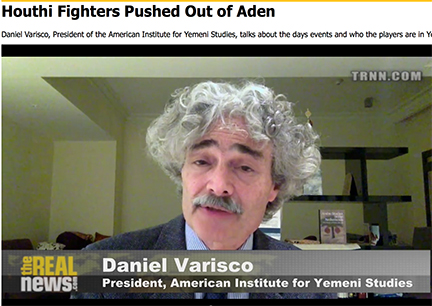
The first part of my interview about the current situation in Yemen on The Real News…
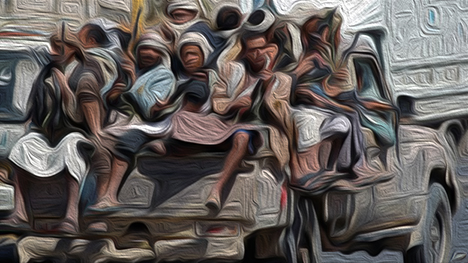
All eyes at the moment are glued to the news about the aerial attacks by a coalition of Saudi, GCC and Jordanian planes (with more to come it seems) on Huthi and military targets in Yemen. This is not a scenario I want to see; this is not a commentary I want to write. Yemen is imploding, the victim of long standing foreign involvement, local rivalries fueled by the insecurity with the removal of Ali Abdullah Salih and, in large part, the insatiable drive of Salih and his supporters to regain power. The Arab Spring removal of Salih was relatively peaceful, at least in terms of a military standoff and an explosion that could easily have ended Salih’s life but for the grace of the Saudis to put him back together. Guns abound in Yemen, as everyone knows, but the kind of hate-fueled warfare that has engulfed Iraq and Syria had not erupted. There was a national dialogue that most, but not all, groups participated in. There was a glimmer of hope.
This morning that glimmer seemed much dimmer, following on the rapid turn of events since the Huthi takeover of Sanaa and the recent escape of President Hadi to Aden. Yemen’s fragmented military is no match for the Saudi coalition arsenal directed by American intelligence. A bunch of gabilis in pick-up trucks may look tough on first glance, but they might as well be riding chariots. Reports suggest Saudi Arabia has assembled a force of some 150,000 at their border, with fears that a local RISK game will break out after the bombing has nullified the capacity of the Huthis to resist any advance. Continue reading As Yemen implodes
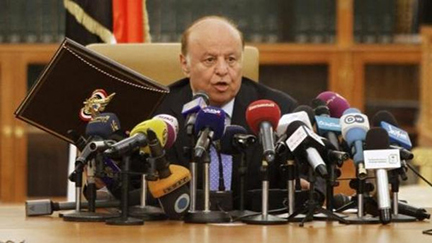
President Hadi, who is currently governing from Aden
Yemen’s legitimacy crisis is not new but is critical
By: Sama’a al-Hamdani, al-Araby al-Jadid, 3 March, 2015
On February 21, Yemen’s President Abd-Rabbo Mansour Hadi, escaped the Houthi-mandated house arrest and successfully fled to the southern city of Aden. A few hours later, al-Jazeera television broadcast a statement by the then resigned president. At the end of the statement, Hadi signed his name, “Abd-Rabbo Mansour Hadi, President of the Republic of Yemenâ€. It strongly suggested he had withdrawn his resignation.
So Yemen is now left arguably with two former presidents (Hadi and Ali Abdullah Saleh), a hugely powerful rebel militia leader (Abdulmalik al-Houthi), several secessionist movements (a couple of Southern Hiraks, a Marib Hirak and a Tihaman Hirak), UN-backed transitional committees, and two transitional agreements (The Gulf-Cooperation Council (GCC) transitional deal of 2011 and The Peace and Partnership Agreement of 2014).
In this confusion what, or rather, who, has legitimacy? Continue reading Yemen’s legitimacy crisis

by Samaa Al Hamdani, Fikra Forum, February 20
[For this article in Arabic, click here.)
Last September, a rebel militia known as the Houthis successfully captured large portions of Yemen’s north and its capital, Sana. A few months later, in January 2015, President Abdu Rabu Mansour Hadi and his government resigned following clashes with the Houthis. By February 10, diplomatic missions in Sana’a had evacuated the country to protest the “illegitimate Houthi takeover.†Overnight, the Houthis became Yemen’s new rulers, but very little was known about them.
The enigmatic Houthi movement transformed from a Zaydi revivalist group in the early 1990s, to a rebel movement in the mid-1990s, to an enemy warring against the Yemeni state in the early 2000s. Following the revolution in 2011, the Houthis secured 33 seats in the National Dialogue Conference (NDC), because they had significant local influence and were considered victims of the former regime. The Houthis were granted a specialized committee in the NDC solidifying them as an influential political player. However, as soon as the dialogue concluded, the Houthis lost faith in the internationally backed political transition. Since then, the Houthis – led by Abdul-Malik al-Houthi – have employed Machiavellian tactics to gain influence in Yemen, taking advantage of the dismal performance of Hadi’s National Unity Government to seize territory and power.
In September 2014 Hadi lifted fuel subsidies, which angered much of the Yemeni population and provided an opening for the Houthis. Cleverly, the Houthis sided with the people against the government; thereafter, within six days, they seized the capital. Months later, on February 11, they mobilized mass protests to overshadow any activities by the opposition. It is likely that a Houthi-led protest will take place on March 18, the anniversary of the “Friday of Dignity,†during which 56 protestors were killed in 2011. By hijacking public rallies, the Houthis aim to silence the opposition and, in this specific case, avoid criticism by the Gulf Cooperation Council and the United Nations Security Council.
Continue reading Lessons in Yemeni Machiavellianism
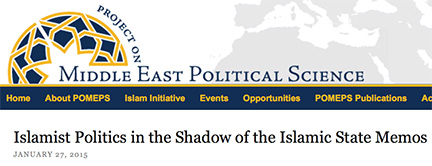
By Stacey Philbrick Yadav, The Monkey Cage, Washington Post, February 2
This post is part of the “Islamist Politics in the Shadow of the Islamic State†symposium.
A Houthi, an Islahi and an independent Islamist walked into a bar. Okay, actually, it was a conference room. It was 2012, and these three youth leaders from rival movements stood together across from a group of similarly diverse secular youth, debating the possibility of a madani (civil) state in Yemen built on an Islamic foundation. In that moment, they were what I call Islamist republicans, more than they were Shafai or Zaydi Muslims (let alone Sunni or Shiite), or members of any particular political organization. By this I mean that they shared an ideological convergence made possible by the upheavals of 2011. That solidarity has been largely (but not entirely) eroded by events over the past two years. But in that moment, those commitments were real and sensible in the context of Yemeni politics. The erosion of the concept of Islamist republicanism in Yemen over the past two years of “transition†has troubling implications for the ability to sustain many Yemenis’ dream of a civil state.
Yemen’s current spiraling crises can be read in light of the proxies and flows of interests outside of Yemen as much as within it. This is not to say that domestic politics aren’t primary – they establish the basic terrain of conflict, without a doubt. But since 2011, Yemen’s politics have been continually negotiated by a complex (often opaque) web of actors stretching from Riyadh in Saudi Arabia and Tehran to Washington and London. This has entailed both qualitative and quantitative shifts in the nature of foreign interest and action in Yemen, much of it driven by anxieties over or misunderstandings of Islamic republicanism. In the face of the transitional government’s resignation on Jan. 22, it became less clear than ever who is actually in charge of what in Yemen. Continue reading Yemen’s Houthis and Islamist republicanism under strain
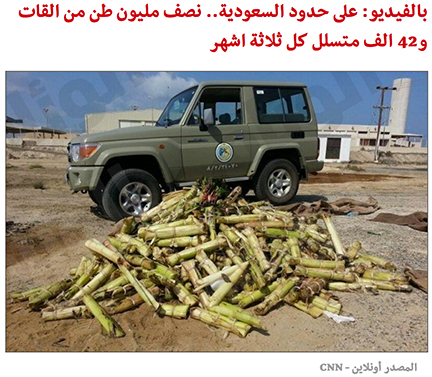
The media news network CNN sent reporter Nic Robertson to the border of Saudi Arabia and Yemen, where he was given a tour and saw several of the Yemenis caught smuggling over the border. One of the items being smuggled was qat. A young boy was given $50 to smuggle it into Saudi territory. The authorities tell him that in the past three months they captured close to half a million tons of qat worth 100 million dollars on the street. Here is one way the Huthis are getting cash. The report indicates that the Saudis are spending a lot of money to build fences and guard towers, although much of the border is so rugged it is impossible to stop everyone. Robertson is a bit overactive in his role at one point telling the Saudi interior spokesman with him that the Iranians are behind the Huthis and then saying this is what the Saudis say. I suspect it is what the Saudis say, but it was presented as a statement in the excerpt provided.
You can watch the video here in English, here in Arabic and read about it in Arabic here.

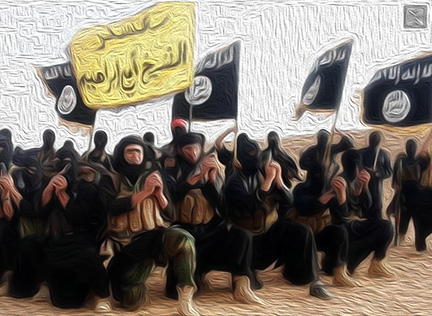
By Amir Hussain, UCObserver
So, what do you think about ISIS?†The question was posed at the end of September by an agnostic colleague at the Jesuit university in Los Angeles. The query was directed at me, no doubt, because I’m the lone Muslim theology professor on staff. And I’m not sure how to respond or what else I can say except that members of the Islamic State of Iraq and Syria are horrific. I also can’t imagine my colleague asking me a comparable question — “What do you think about the Nazis?†or “What do you think of clergy who sexually abuse children?†— and expecting any kind of nuanced answer. I put his question aside.
A couple of weeks later, I was driving home from visiting friends in Santa Barbara when I heard that Warrant Officer Patrice Vincent had been deliberately run over and killed in Saint-Jean-sur-Richelieu, Que. Two days after that, while I was in an airline lounge in Chicago, word flashed across the TV monitors that Cpl. Nathan Cirillo had been shot dead while he guarded the National War Memorial in Ottawa and that the assailant was killed in a hail of gunfire in the corridors of the Parliament Buildings. It turned out that both murderers were self-radicalized converts to Islam. I was horrified.
The October attacks brought back to mind my colleague’s question about ISIS. Perhaps, when he asked, he wasn’t looking for nuance but context. Perhaps he wanted to better understand what motivates and inspires their evil, where the movement came from, how they are able to export their ideologies to troubled young men and women around the world, and how worried we North Americans should be about their threat to us.
My response is the same now as it was before. As shocking and frightening as incidents of “homegrown terrorism†may be, we must keep one fact in mind: the primary targets of Muslim fanatics are much more likely to be other Muslims than non-Muslims. Their main purpose is to force their own skewed version of Islam onto other Muslims. In the same way that Ebola is a serious threat to West Africans, not to North Americans, ISIS is a serious threat in Iraq and Syria, not here in North America. Personally, I’m much more concerned about Islamic fundamentalism in general than I am about ISIS specifically. Continue reading The outer edges of Islam
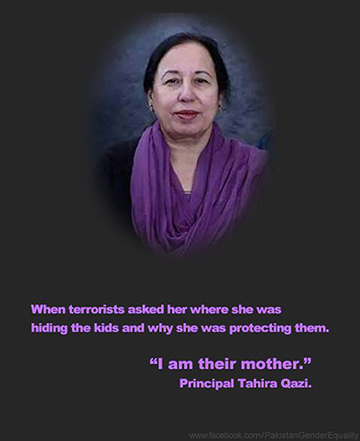
[This story of incredible bravery needs to be widely distributed. As we try to make sense of such a senseless cowardly act, it is well to remember such bravery by these incredible women]
Pakistanis for Gender Equality, December 18, 2014
As the nation mourns the Peshawar school attack, let us also commend the exemplary bravery shown by these women (amongst others) who gave their lives in the hopes of protecting Pakistan’s tomorrow. Who says women are weak? Can our leaders show this kind of resolve to save this country from the TTP barbarians? Let us not let their sacrifices be in vain.
1) Tahira Qazi. Her personal assistant says she had the opportunity to escape the school but instead chose to stay with the students. As the militants fired shots, she rushed from classroom to classroom, shouting at those inside to lock themselves in. She consoled, protected, and ushered many students to safety. She even phoned parents to come and collect their children. One source says, “the honourable principal was asked by the terrorists ‘where are the students and why are you hiding them?’ She replied: ‘Talk to me, I am their mother.’ The terrorists replied ‘Ok, you die first, in a miserable way.’ She was burnt and bullets were fired in her head directly.” Continue reading Heroic Teachers in Peshawer